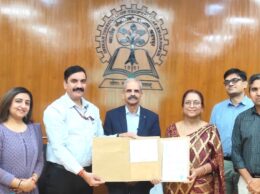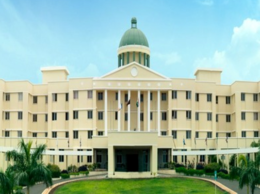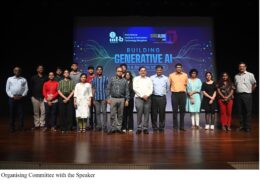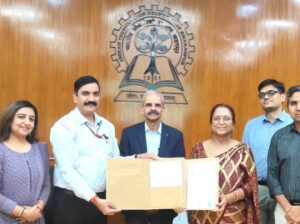Bangalore: The US-based Marconi Society, dedicated to furthering scientific achievements in communications and the Internet, has conferred on legendary Stanford University professor, Thomas Kailath, its Lifetime Achievement Award. This is only the sixth time in the society’s 43-year history that the award has been given. Professor Kailath is Hitachi America Professor of Engineering, Emeritus, at Stanford University (US).
Earlier recipients have included Claude Shannon, the ‘father of Information Theory’ and Gordon Moore of “Moore’s Law” fame. Kailath earned a Bachelor’s degree in Telecommunications Engineering from the College of Engineering, Pune, in 1956. The Indian government conferred the Padma Bhushan on Prof Kailath in 2009.
The award recognizes Professor Kailath for his many transformative contributions to information and system science over six decades as well as his sustained mentoring and development of new generations of scientists. It acknowledges the wide range of his contributions to information theory, communications, filtering theory, linear systems and control, signal processing, semiconductor manufacturing, probability and statistics, linear algebra, matrix and operator theory, which have directly or indirectly advanced modern communications technology.
The most significant of Kailath’s many contributions include a classic textbook in linear systems that changed the way that subject was taught; special purpose architectures for implementing signal processing algorithms on VLSI chips; novel algorithms for direction finding and spectral estimation.
Kailath and his students hold a dozen patents, and they have successfully transitioned some of the research into industry. Together with his students he co-founded four companies, two of which went public: Integrated Systems, Inc., founded in 1980 and now part of Intel, and in 1996, Numerical Technologies, Inc., acquired by Synopsis in 2003.
Prof. Kailath also fostered a rigorous intellectual research culture at Stanford, while mentoring a stellar array of over a hundred doctoral and postdoctoral scholars, many of whom have gone on to become leaders in academia and in industry. They include Arogyaswami Paulraj, currently Emeritus Professor in the electrical engineering department at Stanford University, who was himself honored with the Marconi Prize in 2014. Kailath and Paulraj, are joint holders of the original US patent for MIMO technology which underpins the technology that drives every Wi-Fi, 4 G, and 5G network today and helps to make them more efficient.
Says Dr Paulraj: “Thomas Kailath has been an influential mentor to a number of Indian academics, including me, who worked in communications and control theory. He hosted many of us at his research group at Stanford University, even in lean times when federal funding was tight. Tom has maintained close linkages with the Indian Institute of Science, Bangalore for over thirty years and in the 1970s, also advised the Ministry of Defence, in setting up the Research Centres at the IITs to support the Air Defense Ground Environment System (ADGES) plan of the Indian Air Force. While the Lifetime Achievement Award from the Marconi Society recognizes Tom’s outstanding contributions at the global level, we in India can take special pride in Prof. Kailath’s remarkable achievements.“
Kailath earned a Bachelor’s degree in Telecommunications Engineering from the College of Engineering, Pune, in 1956. He came to the Massachusetts Institute of Technology (MIT) in 1957 with a research assistantship in the Information Theory Group and his work soon generated widespread notice. His publications in international journals and conferences while still a graduate student were widely acclaimed. After his doctorate in electrical engineering in June 1961, the first Indian-born student to get one at MIT, he was invited by the late Prof. Solomon Golomb to join the pioneering Digital Communications Research Group at the Jet Propulsion Laboratory. Kailath simultaneously held a visiting assistant professorship at Caltech.
In January 1963, he accepted an associate professorship at Stanford, becoming a full professor in 1968. He served as Director of the Information Systems Laboratory from 1971 through 1980, building it into a world-leading center for communications, control and signal processing research. He was Associate Chair of the Electrical Engineering Department Chair from 1981 to 1987 and in 1988 was appointed as the first holder of the Hitachi America Professorship in Engineering at Stanford. Although he became Emeritus in June 2001, he has been recalled to active duty, and he continues his research and writing activities to this day.
Kailath’s extraordinary career has earned him dozens of major awards and honours, notably a 2012 National Medal of Science from President Obama “for transformative contributions to the fields of information and system science, for distinctive and sustained mentoring of young scholars, and for translation of scientific ideas into entrepreneurial ventures that have had a significant impact on industry”. His 2007 IEEE Medal of Honor was “for exceptional contributions to the development of powerful algorithms for communications, control, computation and signal processing.”
The Indian government conferred the Padma Bhushan on Prof Kailath in 2009.
Prof S. Sadagopan, Director of the International Institute of Information Technology, Bangalore says: “Prof. Kailath has been an inspiration for generations of Indian students in communication and information systems. Many of them were privileged to hear him for the first time, when he presided over our convocation ceremony in 2011 — and he quickly attained rock star status here.”
Dr. Robert Lucky, former Bell Labs Chief and Chairman emeritus of the Marconi Society, says, “Awards become defined by the names of those who have won the award. In the case of the Marconi Society Lifetime Achievement Award, the award is given to a person whose name is immediately recognizable to most people in communication as someone who towers over the field — someone perhaps not appropriate for the Marconi Prize itself, but in another sense overqualified for it. Gordon Moore and Claude Shannon were such persons, and Tom Kailath is another. I’m proud to say that he is one of us. Moreover, he represents the best of us.”
Kailath will receive his award at the annual Marconi Society Awards dinner in Summit, New Jersey, on October 3, where another Indian, former Bell Labs President Arun Netravali, the “father of digital video”, will be honored with the $100,000 Marconi Prize.









